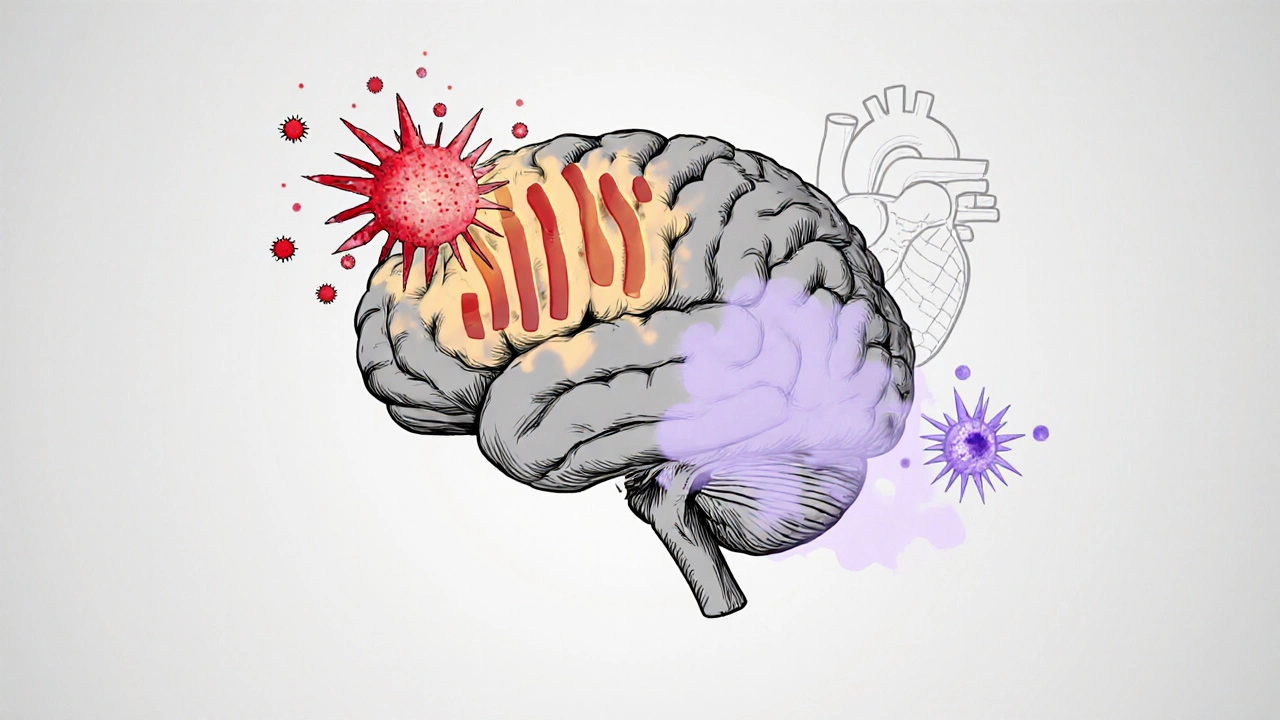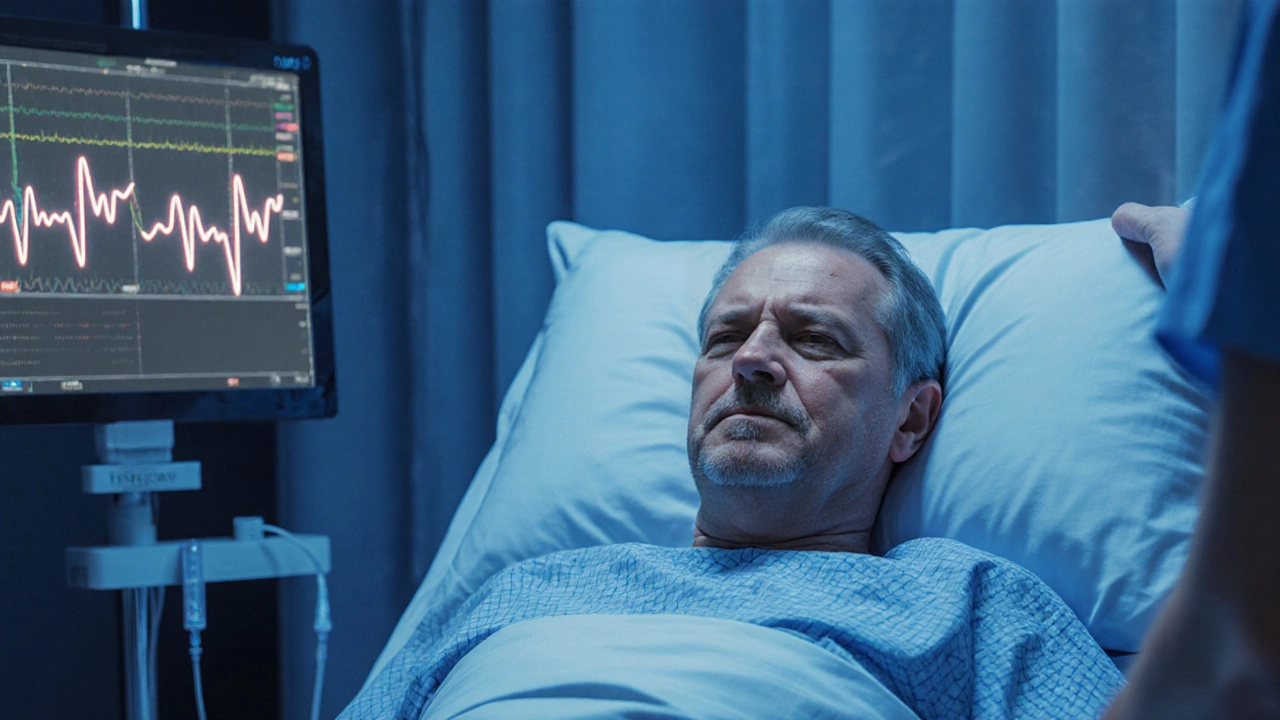Anger Impact Estimator After Heart Surgery
This tool estimates how biological factors, medications, and lifestyle affect your anger levels after open-heart surgery. Based on your responses, you'll receive personalized insights and practical strategies from the article.
Recommended actions:
Feeling a surge of anger after a life‑saving operation can be bewildering. You survived a major procedure, yet you’re snapping at family, feeling irritable for no obvious reason. The good news? You’re not alone, and there are clear medical and psychological reasons behind that post‑surgery fury.
What the body goes through after Open-heart surgery is a complex, invasive operation that temporarily shuts down the heart to repair or replace damaged structures. The stress of the procedure triggers a cascade of biological reactions that can linger for weeks or months.
During the operation, your brain receives signals of danger, your immune system lights up, and hormone levels swing wildly. When you emerge from the OR, those internal alarms don’t switch off instantly. That’s why many patients report mood swings, sudden anger, or a general sense of agitation.
Biological triggers that fuel anger
Three main physiological players often show up after cardiac surgery:
- Inflammation - The body’s natural response to tissue injury releases cytokines that can affect brain chemistry, leading to irritability.
- Cortisol - Known as the stress hormone, cortisol spikes during and after surgery. Elevated cortisol can heighten aggression and reduce patience.
- Anesthesia - Certain anesthetic agents linger in the system, interfering with neurotransmitters that regulate mood.
These factors don’t act in isolation. Inflammation can make cortisol levels stay high, and both can alter the balance of serotonin and dopamine, the brain chemicals that keep emotions in check.
Medication side effects you might not expect
After a heart operation, doctors prescribe a cocktail of drugs to keep your new heart functioning smoothly. While essential, some of these medicines have mood‑changing side effects.
- Beta blockers - They reduce heart rate and blood pressure but can also blunt emotional expression, leading some patients to feel “flat” or unexpectedly irritable.
- Opioid pain relievers - Short‑term use can cause mood swings; long‑term exposure may increase anxiety.
- Statins - Rarely, they are linked to muscle pain and low mood, which can manifest as frustration.
Below is a quick comparison of common post‑surgery meds and their typical impact on mood.
| Medication | Primary Purpose | Common Mood Side‑Effect | Management Tip |
|---|---|---|---|
| Beta blockers | Control heart rate | Irritability, emotional blunting | Discuss dosage adjustment with cardiologist |
| Opioids | Pain relief | Rapid mood swings | Gradual taper, add non‑opioid analgesics |
| Statins | Cholesterol management | Low mood, anxiety | Consider alternative lipid‑lowering agents |

Psychological stress and trauma
Open‑heart surgery is a high‑stakes event. Even when the outcome is good, the experience can feel traumatic. The fear of death, the sensation of being hooked up to machines, and the loss of control can leave a lingering imprint.
Many patients develop a condition called post‑traumatic stress disorder (PTSD) after intensive care stays. One hallmark of PTSD is heightened anger or irritability, especially when reminded of the hospital environment.
Beyond PTSD, simply adjusting to a "new normal" can be taxing. You may now have restrictions on lifting, driving, or even certain foods. Those limits can feel like a loss of independence, sparking frustration.
Disrupted sleep and physical fatigue
Sleep is a major mood regulator. After surgery, patients often struggle with sleep due to pain, medication timing, or the need for nighttime monitoring. Poor sleep amplifies cortisol, creating a vicious cycle of sleeplessness and anger.
Physical fatigue also plays a role. Your heart is healing, your muscles are weak, and daily tasks require more effort. Exhaustion reduces patience, making minor annoyances seem magnified.

Practical ways to calm the anger storm
Understanding the root causes is the first step. Here are evidence‑based strategies that can help you regain emotional balance:
- Talk to your cardiac team: Bring up mood changes during follow‑up visits. They can adjust medications, refer you to a psychiatrist, or suggest a cardiac rehab program that includes mental‑health support.
- Start Cardiac rehabilitation early. Structured exercise, education, and peer support have been shown to cut anxiety by up to 30% and improve mood stability.
- Practice mindfulness or breathing exercises. Even a 5‑minute daily session can lower cortisol and reduce anger spikes.
- Keep a sleep hygiene checklist: dim lights an hour before bed, limit caffeine after noon, and use a consistent bedtime routine.
- Consider counseling or cognitive‑behavioral therapy (CBT). CBT specifically addresses anger triggers and teaches coping skills.
- Stay active within safe limits. Light walking improves circulation, releases endorphins, and combats fatigue.
- Maintain a balanced diet rich in omega‑3 fatty acids (fish, flaxseed). Research links omega‑3 intake to lower aggression.
- Lean on your support network. Share your feelings with family or join a post‑surgery support group where others understand the emotional rollercoaster.
When to seek professional help
If anger is frequent, intense, or leads to aggression, it’s time to get extra support. Watch for these red flags:
- Thoughts of self‑harm or harming others.
- Persistent sadness, hopelessness, or loss of interest in previously enjoyed activities.
- Physical symptoms like chest pain, rapid heartbeat, or shortness of breath that worsen with anger.
- Inability to perform daily tasks because of mood spikes.
Contact your cardiologist, a mental‑health professional, or call emergency services if you feel unsafe.
Bottom line - Anger after open-heart surgery anger is a real, multi‑factor response, not a personal failing
By recognizing the biological, medication‑related, and psychological contributors, you can take targeted actions to calm the storm. Open communication with your care team, lifestyle tweaks, and professional counseling create a roadmap back to emotional well‑being.
Why do I feel angry after my heart surgery even though I’m feeling physically better?
Physical recovery can outpace emotional healing. Hormonal spikes, inflammation, medication side‑effects, and the trauma of the operation all combine to raise irritability, even when the incision is healing.
Can my blood‑pressure medication cause anger?
Yes. Beta blockers, a common post‑surgery drug, can lead to emotional blunting or sudden irritability in some patients. Talk to your cardiologist about dosage or alternatives if anger becomes a problem.
Is it normal to have trouble sleeping after open‑heart surgery?
Absolutely. Pain, medication timing, and the stress of recovery often disrupt sleep patterns. Poor sleep feeds into anger, so prioritizing good sleep hygiene is crucial.
When should I consider therapy for post‑surgery anger?
If anger interferes with relationships, work, or daily activities, or if you notice thoughts of self‑harm, seek counseling promptly. Cognitive‑behavioral therapy has proven effective for anger management after major surgeries.
Can exercise help reduce my irritability?
Yes. Light aerobic activity, as recommended in cardiac rehabilitation, releases endorphins, lowers cortisol, and improves sleep - all of which calm anger.
